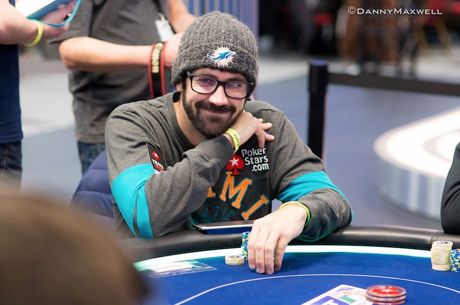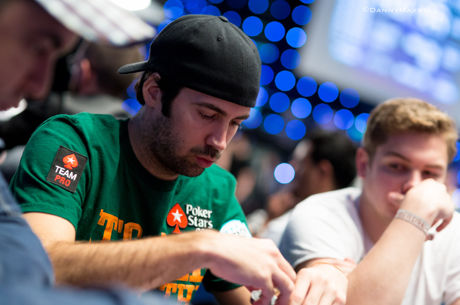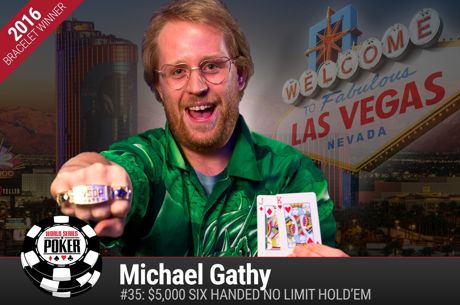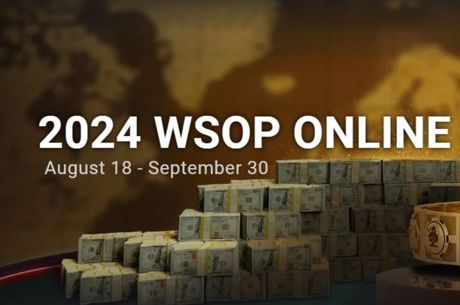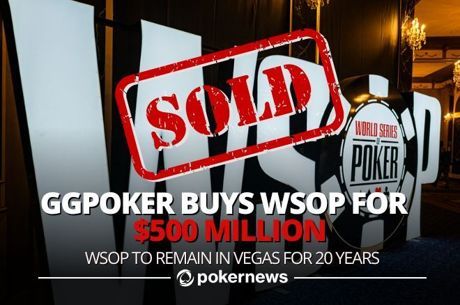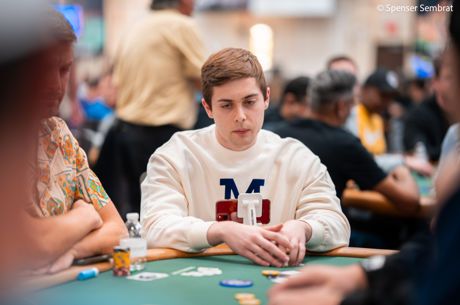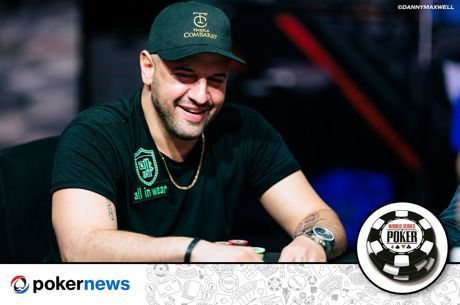What if the WSOP Awarded Olympic Gold, Silver and Bronze Medals?

With the 2016 Summer Olympics now in full swing, and only weeks removed from the most recent World Series of Poker, the similarities between both events are striking.
The greatest players from every conceivable game, variant, and discipline gather to compete on the grandest stage, each vying for the hardware which defines excellence within their field. Hundreds of countries are proudly represented, so patriotism is always in the air whenever a national anthem signals the start of a long-awaited celebration.
And every so often, an elite individual effort transcends the entire affair, leaving the world to watch in wonder as one person pushes the boundaries of what is possible.
Whether it's American swimming legend Michael Phelps winning gold three times to start his Summer Games, or Jason Mercier nearly doing the same to kick off this year's WSOP, these international spectacles have a way of bringing out the very best in the elite competitors who attend.
Along with impressive personal performances, the Olympics also provide a platform for countries to test their collective mettle.
As the games continue in Rio de Janeiro, Brazil, the United States tops the current medal count, both in terms of gold (28) and total podium appearances (86). Great Britain sits in second-place when it comes to gold (19), and third in overall medals (50). Conversely, China has won the third-most gold medals (17), and is second only to the U.S. overall (51).
But how would the medal leaderboard look if we turned the focus back to the other Rio? That's what PokerNews wanted to know, so we dove deep into the data to come up with the following WSOP medal count analysis.
For the sake of this discussion, bracelet wins are as good as gold medals, while runner-up finishes equate to silver-medal showings, and third-place results return the bronze.
The Main Event has been paused pending the November Nine, leaving a total of 68 completed bracelet events at the 2016 WSOP. With three podium spots apiece, there would normally be 204 "medals" won over the course of the summer, but the addition of a new $1,000 Tag-Team No-Limit Hold'em event added four more medals to the equation (one extra bracelet, plus two more silvers for the three-player runner-up team, and an additional bronze to the two-man third-place tandem).
All told, 208 medals were won during more than six weeks of WSOP action, and predictably, the United States took home most of the hardware.
American Medal Count
| Nation | Gold | Silver | Bronze | Total |
|---|---|---|---|---|
| USA | 53 | 41 | 45 | 139 |
In winning 53 of the 69 bracelets awarded, American players dominated the proceedings altogether, while adding 41 silver medals and taking the bronze 45 times.
Mercier's incredible gold-silver-gold blitz in the prestigious $10,000 Championship level events, on his way to securing eventual Player of the Year honors, highlighted Team USA's tear.
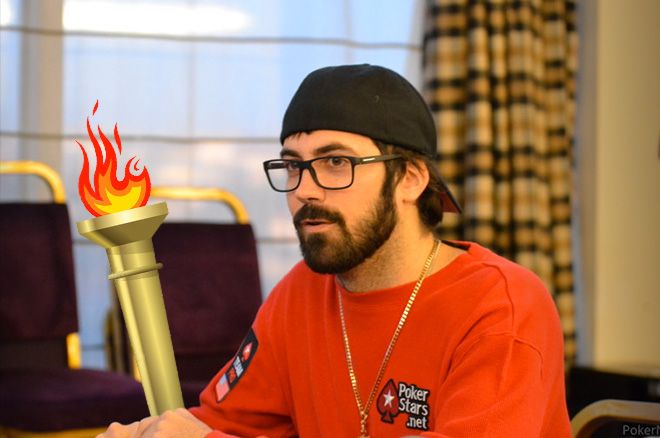
Ian Johns was another star, joining Mercier in the double-bracelet club.
And even though it's likely little consolation, Justin Bonomo would've been the most decorated medalist at the WSOP Olympiad, earning two silvers and two bronzes while just missing out on his second career bracelet. That makes five runner-up results and three third-place finishes on the WSOP stage for Bonomo over his career, making him kindred spirits of sorts with American swimmer Shirley Babashoff, who won six silver medals during the 1972 and 1976 games to tie for the most consolation prizes in Olympic history.
But even considering those impressive hauls, of the 101,096 total entries spanning every event but the Main, American players accounted for 84,027 buy-ins �� or 83.1 percent of the combined WSOP field. When judged on a proportional basis, the U.S. contingent actually came up quite short, putting themselves on the podium with a first, second, or third-place finish just 66.8 percent of the time.
This was an assault based on volume alone, as the Americans had to make the money 11,914 times in order to register 139 podium placements �� or one medal result for every 85 cashes.
Germany, on the other hand, was much more efficient in its use of entries and cashes, making the country's performance as the top international medal earner all the more impressive. Players hailing from Germany lodged just 1,169 entries over the summer, but they parlayed those into a pair of bracelet wins, four runner-up finishes, and three more third-place runs.
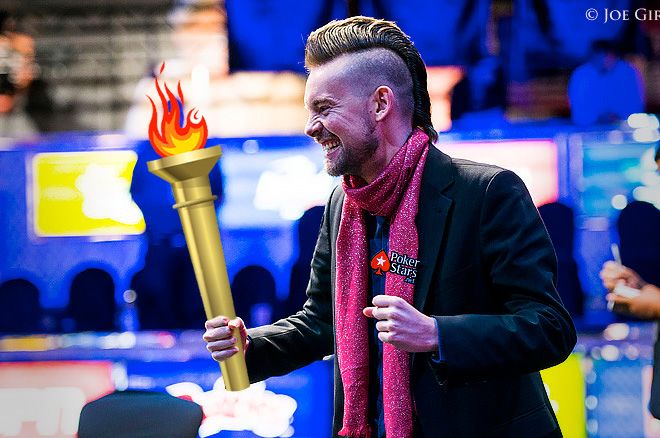
Led by the dynamic duo of George Danzer and Fedor Holz, German players found the podium nine times �� tying them with Canada for the second-most total medals �� to win 4.3 percent of all medals awarded while contributing only 1.1 percent of combined entries. In all, German players cashed on 267 occasions, and right around one out of every 30 of those added to their table-topping medal count.
International Medal Count
| Nation | Gold | Silver | Bronze | Total |
|---|---|---|---|---|
| Germany | 2 | 4 | 3 | 9 |
| Canada | 1 | 3 | 5 | 9 |
| England | 3 | 2 | 1 | 6 |
| Australia | 1 | 2 | 2 | 5 |
| Belgium | 1 | 4 | 0 | 5 |
| Russia | 2 | 0 | 2 | 4 |
| Spain | 2 | 0 | 1 | 3 |
| China | 1 | 1 | 1 | 3 |
| Austria | 0 | 2 | 1 | 3 |
| Bulgaria | 0 | 2 | 1 | 3 |
| France | 0 | 2 | 1 | 3 |
| Sweden | 2 | 0 | 0 | 2 |
| Ireland | 0 | 1 | 1 | 2 |
| Italy | 0 | 0 | 2 | 2 |
| Finland | 1 | 0 | 0 | 1 |
| Czech Rep. | 0 | 1 | 0 | 1 |
| Costa Rica | 0 | 1 | 0 | 1 |
| Greece | 0 | 1 | 0 | 1 |
| Hungary | 0 | 1 | 0 | 1 |
| Scotland | 0 | 1 | 0 | 1 |
| Venezuela | 0 | 1 | 0 | 1 |
| Israel | 0 | 0 | 1 | 1 |
| Lebanon | 0 | 0 | 1 | 1 |
| Wales | 0 | 0 | 1 | 1 |
Canada posted only a single bracelet winner, but Kristin Bicknell's big win in Event #46: $1,500 Bounty NLHE was supplemented by five bronzes. In fact, Canada's propensity for taking third represented the largest haul of a particular medal by any non-U.S. country all summer. Along with three silvers, America's northern neighbors earned nine medals overall, tying them with Germany for the international lead.
It took 4,586 total entries for Canada, however, so Germany was just about four times as efficient with its entry-to-medal ratio.
The Canadian team was also quite unique in that all nine of its medals were won by different players, with no repeat appearances on the podium. Joining Bicknell were Mike Watson (silver), Timothy Vukson (silver), Michael Gentili (silver), Tyler Bonkowski (bronze), Kam Low (bronze), [Removed:412] (bronze), William Liang (bronze), and Marc-Olivier Carpentier-Perrault (bronze).
England rode the stellar showing of Benny Glaser and his pair of bracelet wins to a third-place on the international medal table, appearing on the podium six times overall.
Interestingly, in the genuine Olympics, England's athletes are joined by those of fellow United Kingdom members Scotland and Wales to form the Great Britain squad. Both Scotland and Wales managed a single medal apiece at the WSOP, with Welshman Roberto Romanello taking bronze in Event #17: ($1,000 NLHE), and Scot Niall Farrell securing the silver in Event #50: ($1,500 NLHE Shootout).
So all told, a team representing all of Great Britain at the WSOP would have upped England's medal count from six to eight, putting them one off the overall lead.
Australia turned in an extremely balanced slate of tournaments, landing five different players on the podium: Martin Kozlov (gold), Craig Blight (silver), James Obst (silver), Michael Addamo (bronze), and Jarred Graham (bronze).
With only 955 total entries to work with, Australia also managed to make the most of a limited slate, turning in one medal performance for every 191 buy-ins. Considered alongside Brazil, which failed to produce a single podium finish in 970 total entries, Australia's performance is made all the more impressive.
Balance wasn't in the cards for Belgium, as Michael Gathy single-handedly secured three of his homeland's five medals �� winning a bracelet in Event #35: $5,000 Six-Handed NLHE, while settling for silver twice more.
Of the 107 nations represented at the WSOP, only 11 managed to join America in the winner's circle with a bracelet win: England (three), Germany (two), Russia (two), Spain (two), Sweden (two), Australia, Austria, Belgium, Canada, China, and Finland.
Expanded to podium appearances, 24 flags flew alongside the stars and stripes following medal wins, a diverse group which includes U.K. members Scotland and Wales, Lebanon and Israel from the Middle East, the Latin American locales of Venezuela and Costa Rica, and Hungary and the Czech Republic in Central Europe.
Aside from the aforementioned tag-team tournament, the WSOP differs from the Olympics in one crucial way: individual talent rules the day.
Countrymen compete against one another on the felt, a practically unheard of prospect for Olympic athletes, and even the most talented countries can succumb to friendly fire. Multiple-medalists like Mercier and Bonomo must wade through thousands of others on their way to repeated podium appearances, in a grueling process that isn't all that different from the rigorous qualification system used to set national team rosters ahead of the Games.
Of the more than 100,000 entries recorded this summer, representing 107 different nations, 15,767 players managed to make the money with at least a minimum cash.
Only 17 of those, or 0.11 percent of cashing players, managed to medal more than once by notching multiple finishes of at least first, second, or third place.
Like Phelps and his fellow U.S.A. Swimming superstar Katie Ladecky, these are the outliers; players capable of quieting their nerves and summoning their superior skills even when others around them falter and fade away.
Top Individual Performances
| Player | Nation | Gold | Silver | Bronze | Total |
|---|---|---|---|---|---|
| Justin Bonomo | USA | 0 | 2 | 2 | 4 |
| Jason Mercier | USA | 2 | 1 | 0 | 3 |
| Michael Gathy | Belgium | 1 | 2 | 0 | 3 |
| John Monnette | USA | 0 | 1 | 2 | 3 |
| Benny Glaser | England | 2 | 0 | 0 | 2 |
| Ian Johns | USA | 2 | 0 | 0 | 2 |
| Brandon Shack-Harris | USA | 1 | 1 | 0 | 2 |
| Rafael Lebron | USA | 1 | 1 | 0 | 2 |
| Loren Klein | USA | 1 | 1 | 0 | 2 |
| Ryan D��Angelo | USA | 1 | 0 | 1 | 2 |
| George Danzer | Germany | 1 | 0 | 1 | 2 |
| Marco Johnson | USA | 1 | 0 | 1 | 2 |
| Koray Aldemir | Poland | 0 | 1 | 1 | 2 |
| Tommy Le | USA | 0 | 1 | 1 | 2 |
| Randy Ohel | USA | 0 | 1 | 1 | 2 |
| Dan Smith | USA | 0 | 1 | 1 | 2 |
| Yequi Zhu | China | 0 | 1 | 1 | 2 |
Among this select group of multiple medalists is a more exclusive club, as a handful happened to make their mark in the $10,000 and $50,000 Championship-level tournaments.
As mentioned above, all three of Mercier's podium finishes occurred on the Championship level, as he won Event #16: $10,000 2-7 Single Drawand Event #24 $10,000: H.O.R.S.E to bookend a runner-up result in Event #20: $10,000 Razz.
Bonomo also landed three medals in Championship events, taking silver in Event #55: $50,000 Poker Players Championship, and bronze in both Event #39: $10,000 Six-Handed No Limit Hold'em and Event #43: $10,000 Stud Hi-Low.
In the latter, Bonomo was busted by eventual victor Danzer, who scored both of his medals in Championship events. Along with his fourth career bracelet in the stud hi-low, Danzer finished third in Event #3: $10,000 Stud Championship.
With one more bracelet event left to settle, the upcoming November Nine will produce three more medal winners.
Canada's Griffin Benger enters the Main Event final table sitting with a seventh-place chip stack, but if he's able to maneuver his way to the podium, he'll push his homeland into the overall international lead. German representation at the November Nine is nil, leaving Canada's path to an undisputed medal count triumph clear for Benger.
Kenny Hallaert has the fourth-largest stack left in play, and a medal for him would increase Belgium's already impressive haul to six �� good for a tie with England in third place overall.
If Vojtech Ruzicka can spin up his sixth-place stack into a place on the Main Event podium, he'll double the Czech Republic's count from one to two.
And even though he's riding the short stack, Fernando Pons has an outside chance to move Spain out of the current five-nation gridlock at three total medals into more rarefied air.
Be sure to complete your PokerNews experience by checking out an overview of our mobile and tablet apps here. Stay on top of the poker world from your phone with our mobile iOS and Android app, or fire up our iPad app on your tablet. You can also update your own chip counts from poker tournaments around ?the world with MyStack on both Android and iOS.

